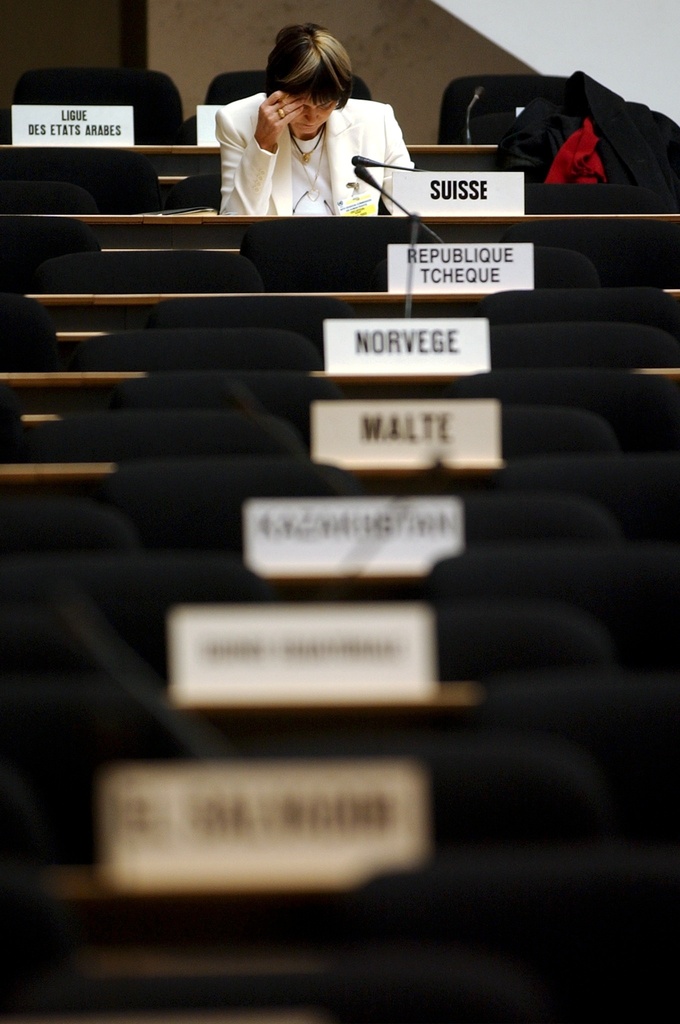How the UN “Swiss paradox” was resolved

On March 3, 2002, the Swiss population narrowly voted to join the United Nations – a historic decision.
It came after more than half a century of refusing to be part of the body, out of fears linked above all to safeguarding Switzerland’s cherished neutrality.
“The Swiss have arrived. We have waited a long time,” said the then UN Secretary-General, Kofi Annan, as he welcomed the Swiss delegation ten years ago.
Switzerland’s decision not to join the UN had been viewed with incomprehension by the rest of the world. How come a country which had actively participated in the League of Nations before the Second World War and which hosted many parts of the UN afterwards, didn’t want to join?
To fully understand this “Swiss paradox” requires a step back in history – to June 26, 1945 when 51 countries signed the UN Charter in San Francisco.
Switzerland felt disappointed by the failure of the League of Nations and viewed its successor, the UN, as a kind of “winners’ club”. Let the big powers get on with it and then we’ll see, was the prevailing opinion of the time.
Neutrality question
The main reason was, however, linked to the concept of neutrality which had been carefully nurtured by the authorities in Switzerland.
When it joined the League of Nations in 1920, the Swiss government opted for a differentiated view of neutrality – the country remained politically neutral but could participate in economic sanctions. But, in 1938, as the threat of war grew, it returned to complete neutrality.
“This vision of complete or absolute neutrality became mythologised during and after the Second World War. People thought, or pretended to think, that it was above all neutrality which had saved the country from conflict,” said Zurich University historian Carlo Moos.
“This was spread for propaganda reasons across the country, but was also to defend Switzerland from attacks from abroad.”
“What the rest of the world saw was Switzerland’s wartime dealings with Nazi Germany. This false neutrality served to lessen Switzerland’s prestige in the eyes of not only the United States, but also Britain and Russia. They saw Swiss neutrality as a sham.”
But the outbreak of the Cold War, just a few years, later, led to a revival of Swiss neutrality. “It was also a sham during this time, as Switzerland became solidly anchored in the western bloc. For the superpowers, especially the US, Swiss neutrality was comfortable and it thus gained a certain value,” Moos said.
Other neutral countries gradually joined the UN – but not Switzerland. In 1986, 75 per cent of the population voted against the move.
Communist fears
“One of the main problems with joining was also that the UN was viewed in centre-right circles and by the right as being controlled by communist countries, especially the General Assembly. After decolonisation, many new countries allied themselves to the eastern bloc,” added the historian.
Times, however, were changing. The fall of the Berlin Wall in 1989 contributed to the decline in importance of Swiss neutrality and the fall of the last ideological barrier within the country.
Domestic debate on the UN soon became dominated by two opposing camps – those who supported opening up to the world by joining the UN and the European Union and their nationalistic opponents on the right, who had gained in force over the past 20 years.
Supporters of opening up argued that Switzerland could no longer hide behind its neutrality and that it should abandon its closed policy for reasons of solidarity with the rest of the world and to better defend its interests.
But those against feared that any opening up would not only threaten neutrality, but also national sovereignty and cohesion.
This latter – not a widespread view – was incomprehensible to many abroad. “It’s a paradox,” wrote Germany’s Die Zeit newspaper in 2002, observing that Switzerland was one of the last countries to remain outside the UN.
“Nobody travels more than the Swiss. No economy exports more in percentage terms than Switzerland. No country has a higher number of foreigners and guests per capita, so many multinationals.”
Member at last
But then came the change: on March 3, 2002, the population approved UN membership, if only by 54 per cent.
A few years beforehand the country had been rocked by the Bergier Report – commissioned by the government to look into the controversy surrounding dormant Holocaust victims’ funds in Swiss banks – which saw the crumbling of the myth of Swiss neutrality in the Second World War and laid bare relations with Nazi Germany.
Ten years after joining the UN, views, however, remain mixed.
“It’s a rather disappointing outcome. One the one hand, our neutrality is being continuously chipped away and on the other, UN participation has not allowed us to improve contacts and Switzerland’s position in the world,” said Werner Gartenmann of the Campaign for an Independent and Neutral Switzerland, a rightwing organisation born out of the 1986 UN vote.
“We see it with the attacks by the US and EU on our financial centre and banking secrecy.”
But state secretary in the foreign ministry, Peter Maurer, said that many fears were unfounded and many expectations had been realised.
“In 2002 we made the right decision at a critical moment in history, when Switzerland’s suspicious attitude threatened to make it less accepted by other countries.”
Geneva is the main seat of the United Nations, after New York. The Swiss city is host to 7 UN agencies and 242 missions and permanent representatives.
Around 1,500 Swiss work for the UN, with around 70 in top posts.
As a member country, Switzerland contributes around SFr130 million -140 million ($144 million- 155 million) to the UN annually and is the 16th highest contributor to the organisation.
Switzerland also pays in around SFr500 million a year to UN agencies of which it is a member. This contribution dates from before joining the UN.
1920: League of Nations founded in Geneva, with 58 members. 56.3% of male Swiss voters – women were not eligible – accepted the government’s proposal to join.
1945: 51 countries signed the Charter of the United Nations in San Francisco.
1946: First UN General Assembly meeting in London. League of Nations officially disbanded.
1948: Switzerland gained observer status at the UN.
1986: 75.7% Swiss rejecting joining the UN.
1994: 57.2% of voters block a proposal to create a Blue Beret peacekeeping troupe for the UN.
1996: After pressure from the US Jewish community, the Swiss government and parliament create a commission of independent experts to look into Switzerland’s behaviour during the Second World War.
1998-2001: The commission’s Bergier report takes aim at the Swiss neutrality myth, saying Swiss collaborated with Nazis during the war, but also with the Allies.
2002: 54.6% vote in favour of joining the UN in a national ballot on March 3; Switzerland becomes 190th UN member on September 10.
(Translated from Italian by Isobel Leybold-Johnson)

In compliance with the JTI standards
More: SWI swissinfo.ch certified by the Journalism Trust Initiative














You can find an overview of ongoing debates with our journalists here . Please join us!
If you want to start a conversation about a topic raised in this article or want to report factual errors, email us at english@swissinfo.ch.